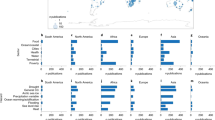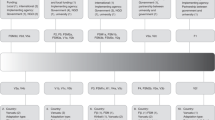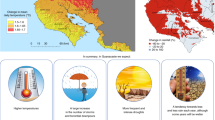Abstract
Technology alone will not be able to solve adaptation challenges, but it is likely to play an important role. As a result of the role of technology in adaptation and the importance of international collaboration for climate change, technology transfer for adaptation is a critical but understudied issue. Through an analysis of Global Environment Facility-managed adaptation projects, we find there is significantly more technology transfer occurring in adaptation projects than might be expected given the pessimistic rhetoric surrounding technology transfer for adaptation. Most projects focused on demonstration and early deployment/niche formation for existing technologies rather than earlier stages of innovation, which is understandable considering the pilot nature of the projects. Key challenges for the transfer process, including technology selection and appropriateness under climate change, markets and access to technology, and diffusion strategies are discussed in more detail.
This is a preview of subscription content, access via your institution
Access options
Subscribe to this journal
Receive 12 print issues and online access
$209.00 per year
only $17.42 per issue
Buy this article
- Purchase on Springer Link
- Instant access to full article PDF
Prices may be subject to local taxes which are calculated during checkout


Similar content being viewed by others
References
Tessa, B. & Kurukulasuriya, P. Technologies for climate change adaptation: Emerging lessons from developing countries supported by UNDP. J. Int. Aff. 64, 17–31 (2010).
Lybbert, T. & Sumner, T. Agricultural technologies for climate change in developing countries: Policy options for innovation and technology diffusion. Food Policy 37, 114–123 (2012).
IPCC Special Report of Working Group III of the Intergovernmental Panel on Climate Change (eds Metz, B., Davidson, O., Martens, J., Van Rooijen, S. & Van Wie Mcgrory, L.) (Cambridge Univ. Press, 2000).
Klein, R. J. T. et al. Application of Environmentally Sound Technologies for Adaptation to Climate Change (UNFCCC, 2006).
Olhoff, A. Adaptation in the context of technology development and transfer. Clim. Policy (in the press, 2014)
Brooks, H. Marshalling Technology for Development 83–96 (National Academies Press, 1995).
Grubler, A. Technology and Global Change (Cambridge Univ. Press, 1998).
Bozeman, B. Technology transfer and public policy: A review of research and theory. Res. Policy 29, 627–655 (2000).
Rogers, E. Diffusion of Innovations (Free Press, 1995).
Sharma, S. & Moehner, A. in Technologies for Adaptation: Perspectives and Practical Experiences (eds Christiansen, L., Olhoff, A. & Traerup, S.) 3–17 (UNEP Risoe Centre on Energy, Climate and Sustainable Development, 2011).
Hayami, Y. & Ruttan, V. Agricultural Development: An International Perspective (John Hopkins Univ. Press, 1985).
Feder, G., Just, R. & Zilberman, D. Adoption of agricultural innovations in developing countries: A survey. Econ. Dev. Cult. Change 33, 255–298 (1985).
Grubler, A., Nakicenovic, N. & Victor, D. G. Dynamics of energy technologies and global change. Energy Policy 27, 247–280 (1999).
Geels, F. Technological transitions as evolutionary reconfiguration processes: A multi-level perspective and a case-study. Res. Policy 31, 1257–1274 (2002).
Edquist, C. in Oxford Handbook on Innovation (ed Fagerberg, J.et al.) 181–208 (Oxford Univ. Press, 2005).
Zilberman, D., Zhao, J. & Heiman, A. Adoption versus adaptation, with emphasis on climate change. Annu. Rev. Res. Econ. 4, 27–53 (2012).
World Development Report (WDR), Development and Climate Change (World Bank, 2010).
Freeman, C. The economics of technical change. Camb. J. Econ. 18, 463–514 (1994).
Bell, M. in Low-Carbon Technology Transfer: From Rhetoric to Realticy (eds Ockwell, D. & Mallett, A.) 45–72 (Routledge, 2012).
Brewer, T. Climate change technology transfer: A new paradigm and policy agenda. Clim. Policy 8, 516–526 (2008).
Ockwell, D. et al. Enhancing developing country access to eco-innovation: The case of technology transfer and climate change in a post-2012 policy framework, OECD Environment Working Papers No. 12. (2010).
Markandya, A. & Galarraga, I. in Technologies for Adaptation. Perspectives and Practical Experiences (eds Christiansen, L., Olhoff, A. & Traerup, S.) 27–42 (UNEP Risoe Centre on Energy, Climate and Sustainable Development, 2011).
Reddy, N. & Zhao, L. International technology transfer: A review. Res. Policy 19, 285–307 (1990).
Gallagher, K. Limits to leapfrogging in energy technologies? Evidence from the Chinese automobile industry. Energy Policy 34, 383–394 (2006).
Strang, D. & Soule, S. Diffusion in organizations and social movements: From hybrid corn to poison pills. Annu. Rev. Sociol. 24, 265–290 (1998).
Freeman, C. The Economics of Hope: Essays on Technical Change, Economic Growth, and the Environment (Pinter Publishers, 1992).
Lewis, J. Technology acquisition and innovation in the developing world: Wind turbine development in China and India. Stud. Comp. Int. Dev. 42, 208–232 (2007).
Lorentzen, J. Learning and innovation: What’s different in the (sub)tropics and how do we explain it? A review essay. Sci. Technol. Soc. 14, 177–205 (2009).
Ruttan, V. What happened to technology adoption-diffusion research? Sociol. Ruralis 36, 51–73 (1996).
Holling, C. Resilience and stability of ecological systems. Annu. Rev. Ecol. Syst. 4, 1–23 (1973).
Becker, D. & Ostrom, E. Human ecology and resource sustainability: The importance of institutional diversity. Annu. Rev. Ecol. Syst. 26, 113–133 (1995).
Low, B., Ostrom, E., Simon, C. & Wilson, J. in Navigating Social-Ecological Systems: Building Resilience for Complexity and Change (eds Berkes, F., Colding, J. & Folke, C.) 83–114 (Cambridge Univ. Press, 2002).
Folke, C., Hahn, T., Olsson, P. & Norberg, J. Adaptive governance of social ecological systems. Annu. Rev. Environ. Res. 30, 441–473 (2005).
Adger, W., Arnell, N. & Tompkins, E. Successful adaptation to climate change across scales. Glob. Environ. Change 15, 77–86 (2005).
Nelson, D., Adger, W. & Brown, K. Adaptation to environmental change: Contributions of a resilience framework. Annu. Rev. Environ. Res. 32, 395–412 (2007).
Chambers, R., Pacey, A. & Thrupp, L. Farmer First: Farmer Innovation and Agricultural Research (Intermediate Technology Publications, 1989).
Snapp, S., Blackie, M. & Donovan, C. Realigning research and extension to focus on farmers’ constraints and opportunities. Food Policy 28, 349–363 (2003).
Sturdy, J., Jewitt, G. & Lorentz, S. Building an understanding of water use: Innovation adoption processes through farmer-driven experimentation. Phys. Chem. Earth 33, 859–872 (2008).
Abramovitz, M. Catching up, forging ahead, and falling behind. J. Econ. Hist. 46, 385–406 (1986).
Bell, M. & Pavitt, K. Technological accumulation and industrial growth: Contrasts between developed and developing countries. Ind. Corp. Change 2, 157–210 (1993).
Ockwell, D., Haum, R., Mallett, A. & Watson, J. Intellectual property rights and low carbon technology transfer: Conflicting discourses of diffusion and development. Glob. Environ. Change 20, 729–738 (2010).
Cohen, W. & Levinthal, D. Absorptive capacity: A new perspective on learning and innovation. Adm. Sci. Q. 35, 128–152 (1990).
Tambo, J. & Abdoulaye, T. Climate change and agricultural technology adoption: The case of drought tolerant maize in rural Nigeria. Mitig. Adapt. Strateg. Global Change 17, 277–292 (2012).
Foster, A. & Rosenzweig, M. Microeconomics of technology adoption. Annu. Rev. Econ. 2, 395–424 (2010).
Smit, B. & Skinner, M. Adaptation options in agriculture to climate change: A typology. Mitig. Adapt. Strateg. Glob. Change 7, 85–114 (2002).
Bryan, E., Deressa, T., Gbetibou, G. & Ringler, C. Adaptation to climate change in Ethiopia and South Africa: Options and constraints. Environ. Sci. Policy 12, 413–426 (2009).
Deressa, T., Hassan, R., Ringler, C., Alemu, T. & Yesuf, M. Determinants of farmers’ choice of adaptation methods to climate change in the Nile Basin of Ethiopia. Glob. Environ. Change 19, 248–255 (2009).
Eichberger, J. & Guerdjikova, A. Technology adoption and adaptation to climate change—A case-based approach. Clim. Change Econom. 3, 41 (2012).
Tompkins, E. & Eakin, H. Managing private and public adaptation to climate change. Glob. Environ. Change 22, 3–11 (2012).
Acknowledgements
We would like to thank all of the staff at each project site for their generous support of the field research. Funding support was received by a research grant from BP, NSF research grant 0966093 IGERT: Water Diplomacy, and the Fletcher School at Tufts University.
Author information
Authors and Affiliations
Contributions
L.K. carried out the proposal analysis, field research for the case studies, and wrote the paper. B.B. and K.S.G. conceptualized the paper and all four authors selected cases. C.O. assisted with access to project documents and coordination of field visits. L.K. performed analysis with contributions from K.S.G. L.K., K.S.G., B.B. and C.O. edited.
Corresponding author
Ethics declarations
Competing interests
B.B. was formerly employed (during analysis) by Global Environment Facility (GEF) as Head of Climate Change Adaptation Strategy and Operations. C.O. was formerly employed (during analysis) by GEF as Program Associate supporting the adaptation portfolio management, Climate Change Adaptation. Neither stands to gain financially from publication.
Supplementary information
Rights and permissions
About this article
Cite this article
Biagini, B., Kuhl, L., Gallagher, K. et al. Technology transfer for adaptation. Nature Clim Change 4, 828–834 (2014). https://doi.org/10.1038/nclimate2305
Received:
Accepted:
Published:
Issue Date:
DOI: https://doi.org/10.1038/nclimate2305
This article is cited by
-
Technology needs assessment for climate change adaptation: Experiences of Mauritius and Seychelles
Regional Environmental Change (2022)
-
Participatory Evaluation and Selection of Improved Food Barley Varieties in the Highland Potential Areas of Central Ethiopia
Proceedings of the National Academy of Sciences, India Section B: Biological Sciences (2022)
-
Determinants of adoption and intensity of improved faba bean cultivars in the central highlands of Ethiopia: a double-hurdle approach
CABI Agriculture and Bioscience (2021)
-
Climate change adaptation and the Least Developed Countries Fund (LDCF): Qualitative insights from policy implementation in the Asia-Pacific
Climatic Change (2017)



